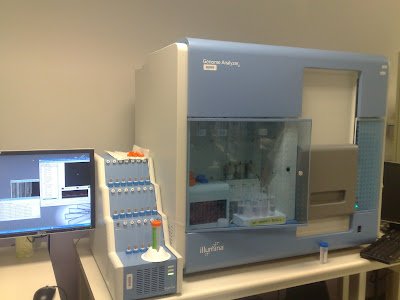Back in 2012 or so, I was really excited that some companies...first American Gut and then uBiome, were offering gut bacteria testing for under $100. These same tests used to cost $1000's and were off-limits to the general public. With the use of new digital methods for testing and cheaper machines, the price of testing gut bacteria is now just a matter of market demand.
 |
| Illumina Genome Analyzer |
I've written several posts on how bacteria are discovered in a stool sample, so I won't rehash that here. However, from nearly the very beginning I was seeing some huge problems. The biggest was that reports from two companies on the same sample rarely looked similar, and the second was that medical conditions and diets rarely corresponded to the bacterial report.
Over the years, I've become increasingly leery of gut testing companies. Ubiome is now offering "suggestions" for changes in diet based on a single report, and even starting a medical-grade test option ("SmartGut") that must be ordered by trained physicians. American Gut is offering a similar feature, called "MapMyGut," also clinician-ordered. But this week an article from Smithonian Science made me realize that there is some transparency in the world of gut testing.
You Are What You Eat, And What You Eat Is Millions of Microbes (Smithsonian.com, June 2017).
We've been discussing the acquisition of microbes for years around here. We discussed how gut bacteria magically appear in your gut based on the food you eat and your daily interactions with the world. Finally the researchers are also looking at this angle, too.
When researchers crunched the numbers, however, they found no discernible correlations between gut communities and those with seemingly similar diets.
This also holds true for medical conditions such as Crohn's disease and the myriad other dysbiosis-inducing diseases we deal with. As I've been preaching for years: When gut dysbiosis gets hold, all bets are off.
I'm quite amazed that Rob Knight of Knight Lab was the leading contributor to this article. Rob was one of the founders of the American Gut project. He's basically admitting that they have learned very little about the gut despite analyzing the feces of over 9000 people. Their new line of bacterial inquiry will be focused on the bacteria found within the foods we eat, they intend to analyze 1000 different foods from around the world to see what secrets they hold.
Bottom Line
While this is a good start, we are still a long ways off from understanding the complex interactions between bacteria and human health. The trend is a focus on bacteria, but there are also phages, viruses, and fungi in the mix. And these collective microbes are not only found on the foods we eat, but they can incorporate themselves into the DNA of the foods we eat...how will Rob Knight suss all this out? I have a feeling that the next blockbuster will be, "When researchers crunched the numbers, however, they found no discernible correlations between gut communities and the bacteria found in the foods they ate."
Take Home Message
Don't worry so much about the microbes that inhabit your gut. Nature has developed ways to get them where they need to be...all that you have to do is eat mostly real food, lots of plants, and very little processed food. Exercise, get dirty, and live a stress-free lifestyle. Get some sun and good sleep. If you have terrible gut problems, the same rules apply, but you may have a tough time sorting it all out. There are plenty of gurus who will promise the world if you follow their advice...but they are just guessing.
Later!
Tim
Just have to love them, the scientists....
ReplyDelete"...understanding the health effects of the microbiome could allow us to engineer those missing microbes back into our meals."
I think it's human nature to follow a path with every new item we encounter:
Delete1. How can I use this thing to help myself?
2. How can I use this thing to help others?
3. How can I use this thing to hurt others?
4. How can I use this thing to get rich?
Great take home points.
ReplyDeleteThis is a wonderful article, Given so much info in it, These type of articles keeps the users interest in the website, and keep on sharing more ... good luck. medical transcription help
ReplyDelete"all that you have to do is eat mostly real food, lots of plants"
ReplyDeleteJust for fun I tried to count all the different plant foods I ate last week. They included
potatoes
rice
green peppers
red peppers
tomatoes (at least half a dozen varieties)
prunes
summer apples (yum!)
peaches (two different varieties)
cucumbers
apricots
bananas
lentils
lettuce
kale
string beans
carrots (three different varieties)
parsnips
onions
olives
plus [much] smaller quantities of beetroot, beet greens, fresh plums, turnips and purple cabbage.